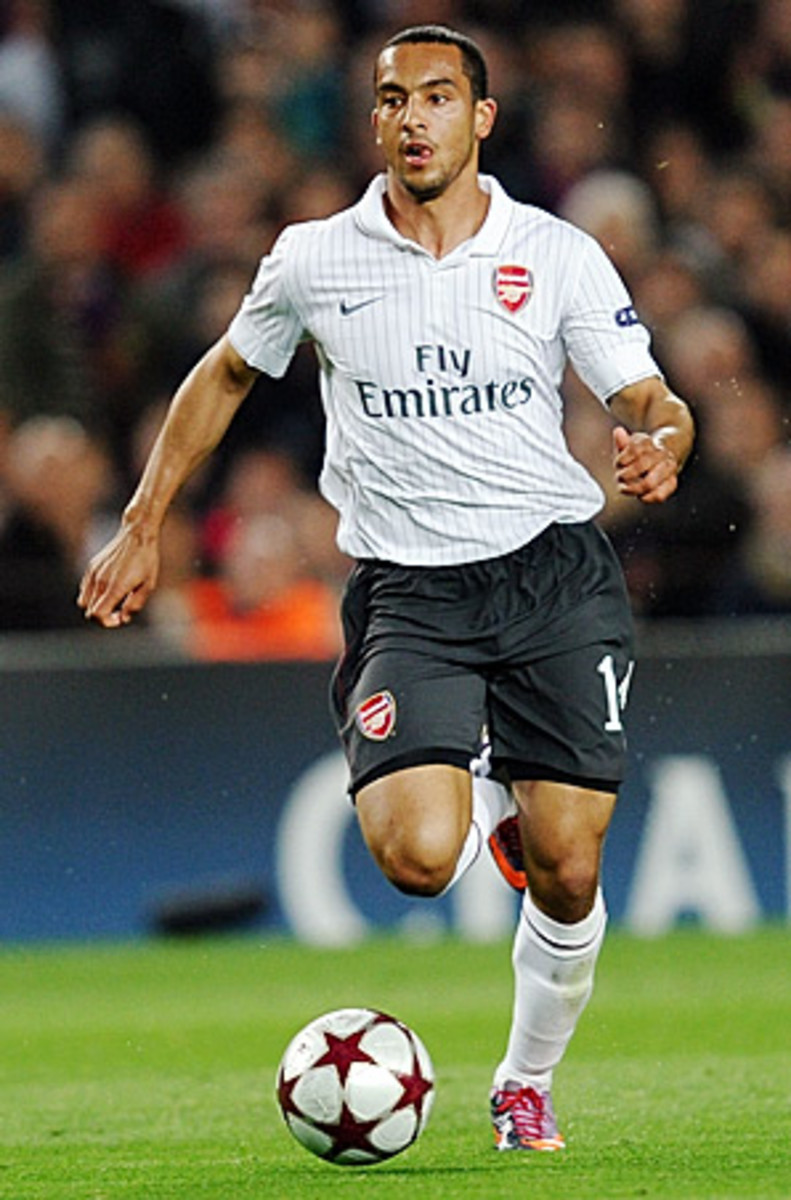Walcott looks forward to World Cup after Arsenal's frustrating season
"We can take some positives from the campaign, as we have done better than last season," Walcott said while sitting in a stately hotel near Arsenal's training complex in Colney. "We have gone to difficult places like Stoke City or Blackburn and won there. But of course there is a sense that it really could have been our season this year. You'll always be judged by how well you do in the big games. We wanted to make the Emirates a fortress, but unfortunately Chelsea and Manchester United just pushed us aside. They are fantastic teams. And we're not quite there yet."
The 21-year-old blames injuries to key players, including to himself, for his side's difficulties. He, too, wonders about Arsenal's age-old problem: a distinct lack of ruthlessness.
"We play fantastic football," he said, "but sometimes we don't know how to do [the basics], to get a result when you're not playing well, a 1-0 or even a draw that will boost your confidence."
But Walcott doesn't accept the widespread notion that a lack of experience is the main reason for Arsenal's inability to capitalize on its fantastic talents.
"Everybody's had a lot of patience with us, the supporters and the manager [Arsene Wenger] have always backed us, and we now owe it to them to deliver," Walcott said. "Hopefully, the titles will come in the next few years. I want to show my kids some winners' medals when I look back on my career. I want to be like [Manchester United's] Ryan Giggs, who's won everything "
"TJ," as they used to call him at school -- his middle name is James -- might not have to wait all that long. The official announcement is still a few days away, but Walcott is certain to make the England squad for the World Cup in South Africa. With Fabio Capello in charge and Manchester United striker Wayne Rooney in devastating form, the "Three Lions" have a real chance to make a real impact this summer. But Walcott -- the nicest, most eloquent and genuine Premier League player you're likely to meet -- is unlikely to get carried away with hopes and expectations. He knows from personal experience that even dreams that become true cannot guarantee happiness.
Four years ago, England manager Sven-Goran Eriksson surprised the whole country by including Walcott in his Germany 2006 squad. The then-17-year-old had not yet played a Premier League game after completing a move from Championship side Southampton in January. Eriksson liked his pace and dribbling skills, but for Walcott, the World Cup came a bit too soon.
"To be honest, I think I didn't really deserve to be there," he said.
Walcott realized he wouldn't feature on the pitch and started making a video diary about his experience. "I watched it again the other day," he said. "You can see how my mood changed: In the beginning, I was so excited, but then I got a bit depressed."
Walcott witnessed the incessant media hype about the supposed "Golden Generation" and the tabloid frenzy surrounding the WAGs (wives and girlfriends) at close range, but he doesn't buy into the populist view that those distractions were chiefly responsible for what ultimately proved an unsuccessful campaign.
"I think we've made these things a problem [after the event]," he said. "I personally loved the fact that my girlfriend and family were there to support me. Maybe we've had a little too much downtime though."
This time, "it should be a completely different story," he suggested. In Capello, England has a proven winner at the helm, a manager who induces fear as well as tremendous respect in the camp. "When he talks, you listen," the versatile attacker said. "You can't keep your eye off him."
He remembers, with a shudder, a training exercise that didn't go according to plan. "The boss stopped play and killed us all for 10 minutes," Walcott said. "He's very direct and very honest with you."
Another time, Walcott was mortified to find he had missed a team meeting because of a misunderstanding. "I went to apologize but he just shrugged his shoulders and closed the door [on me]," Walcott said. "I made sure I was first in everything after that: first on the bus, first at the [training] table ..."
Tactics and personnel haven't changed that much in the four years since England's quarterfinal exit against Portugal, but, according to Walcott, there's been a distinct change in the atmosphere within the camp.
"For many of the more experienced players, this could be their last World Cup, their last chance," Walcott said. "They are aware of that. And in Capello, we now have a manager who can get the best out of us, someone who can make all the individual talent we have work as a team. That's what it's about."
Walcott should have an important role to play, too. A fantastic hat trick at Croatia in a qualification match two years ago hinted at his enormous potential. Recurring injury problems have checked his progress somewhat since then, but his performances toward the end of this season have sent a timely reminder why the News of the World declared him "England's savior" not long ago.
"I'm hoping to do well, if I get the chance. Fingers crossed," he said. That's all he's willing to volunteer at the moment. Walcott doesn't want to "jinx it," as they say in England.
If it's true, as The Guardian put it, that his 2006 World Cup experience "went over ground that is all too familiar to England at a major final: initial excitement and hope giving way to battle fatigue and despondency," then his country must hope that this year's roles are reversed: With a healthy dose of Walcott's professionalism and humility, the rest of the squad might really go quite far.





